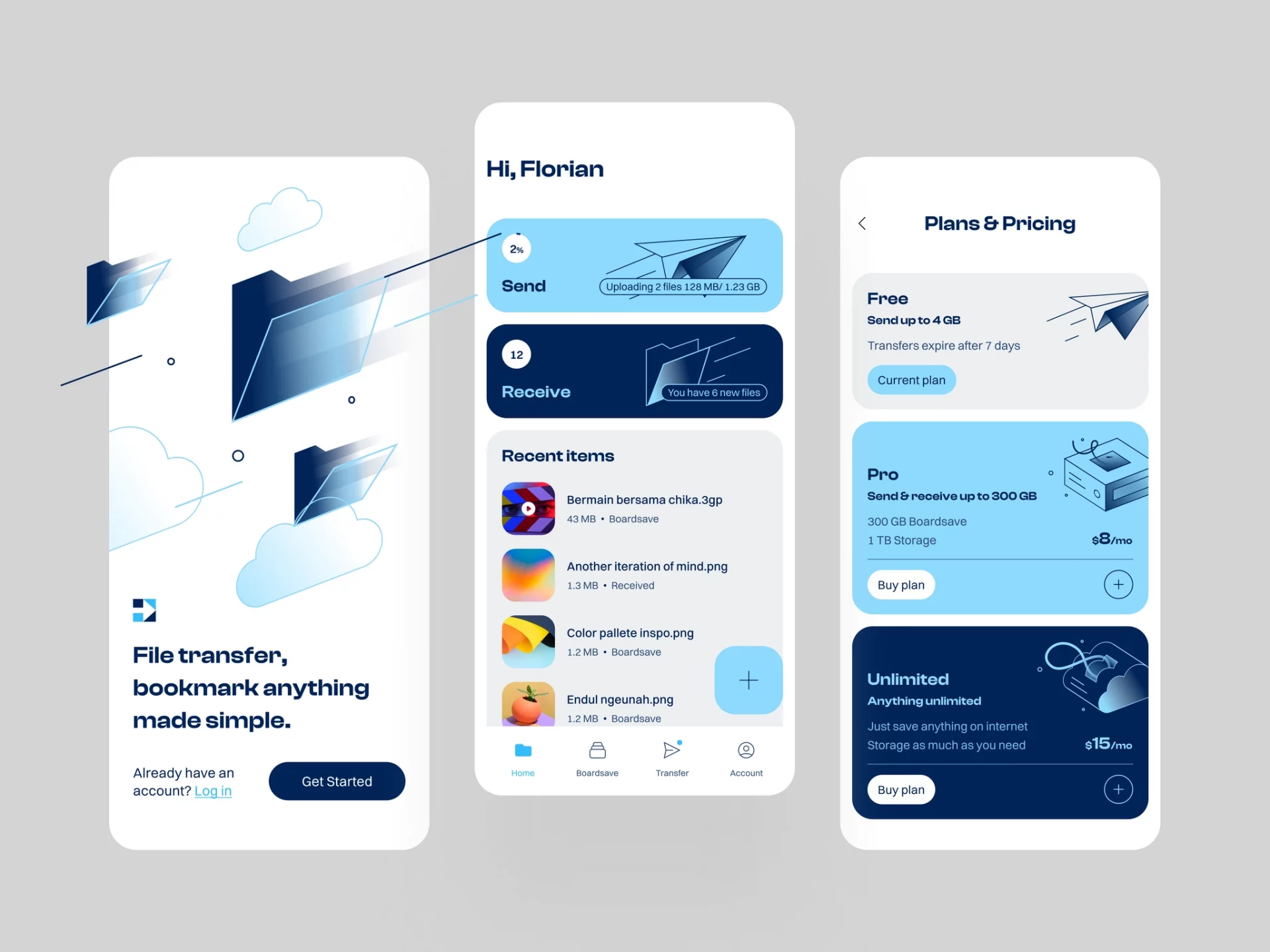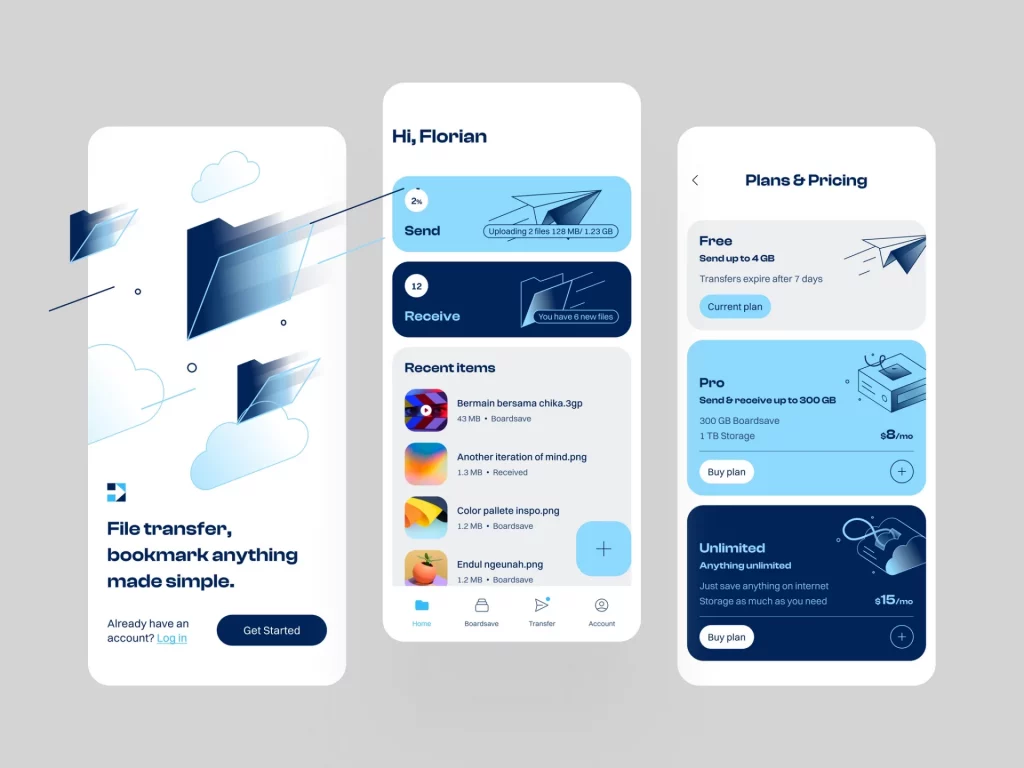Picking the right tech stack for your project is one of the first steps to success. If Node.js is one of your options, this post is for you. Here, we’ll take a look at the benefits of Node.js development, uncover popular application types, and dissect some of the most famous Node.js apps that prove: if you need a functional and scalable product, this is the technology to use.
Fireart on Dribbble
What Is Node.js?
Node.js is a powerful open-source runtime environment that allows building server-side applications with JavaScript. It is built on Chrome’s V8 JavaScript engine and is designed to be lightweight, scalable, and efficient, making it an ideal choice for real-time and high-performance applications.
Node.js also comes with a vast ecosystem of modules and packages, making it easy for developers to build complex applications with minimal effort. With its event-driven, non-blocking I/O model, Node.js is perfect for building data-intensive applications that require real-time communication and collaboration.
This technology has been out there for a while, yet it’s not losing its popularity. Node.js is used by startups, big companies, and just about everyone who wants a fast and efficient product, whether it’s a mobile app, a Node.js web application, or a real-time game.
Types Of Node.js Applications
Versatility is one of the reasons why Node.js is so popular. A single technology can be used to build dozens of applications, from simple to the most complex ones, making it the No.1 choice for many developers. Here are 15 popular types of Node.js applications, but be sure, it’s not even half of the list.
Single-Page Application
The most basic type of Node.js app is a single-page app. These web applications load a single HTML page and dynamically update the content as the user interacts with it. Node.js is particularly well-suited for building Single-Page Applications because it can handle a large number of asynchronous calls and heavy input/output (I/O) workloads faster and more efficiently. It makes it possible to create SPAs that provide a smooth and seamless user experience.
The event loop in Node.js is designed to allow for multiple concurrent client requests, which can be “delayed” until the necessary data is ready for processing. It enables Node.js to handle large amounts of data efficiently, ensuring that SPAs built with Node.js are both fast and responsive.
Real-Time Collaboration Tool
Another great example of Node.js web apps is a remote collaboration tool. Such tools are typically used by multiple users who need to work on a project simultaneously. Collaboration tools require a high level of real-time communication between users, such as sending messages, updating the status of tasks, or sharing files. Node.js is particularly well-suited for building such tools as it can handle multiple connections simultaneously without compromising performance. Besides, Node.js developers can use it with other real-time frameworks, such as WebSockets, to increase scalability and the number of simultaneous connections. Also, hire android developers to polish your projects.
Social Media App
Social media apps need to handle a high volume of requests as users create and share content, send messages, and interact with others in real time. Node.js is particularly well-suited for building social media apps because it can handle many concurrent requests, ensuring fast and responsive performance. With its non-blocking I/O architecture, Node.js can process many requests simultaneously, making it possible to build social media apps that can handle a large number of users and traffic. Additionally, it is easily scalable and can be deployed on multiple servers, which is essential for social media platforms that need to handle a large user base.
Desktop App
Node.js can also be used to create cross-platform desktop applications. One tool that makes it possible is Node-WebKit, the app runtime based on Chromium and Node.js that uses a modified version of Node’s V8 engine. With Node-WebKit, developers can build desktop applications with Node.js as the backend to create fast and responsive desktop applications that run on Windows, macOS, and Linux.
Location-Based App
Node.js is well-suited for building location-based applications because of its event-based architecture and asynchronous nature. With Node.js, developers can quickly create a location-specific application that allows users to find what they want near their area. This functionality is especially beneficial for business owners, who can use Node.js functions on their websites to attract new customers.
Online Payment Processor
Online payment processors require a high level of security and scalability. Node.js provides a robust and secure environment for building online payment processors that can handle a large volume of transactions. Thanks to the built-in support for SSL and TLS, it ensures secure communication between servers and clients. Besides, the Node.js package manager, NPM, provides access to a vast array of third-party modules and libraries to streamline development and ensure code quality.
eCommerce Platform
eCommerce platforms need a fast and reliable backend that can handle large volumes of traffic and transactions, so Node.js’s non-blocking I/O model is a great choice. The flexibility of Node.js also allows developers to use it to build both the server-side and client-side of an eCommerce website, creating a seamless and fast experience for users.
CRM Tool
Customer relationship management (CRM) tools are processing a lot of users’ data simultaneously, so a reliable and efficient backend is a must. With Node.js, developers can create a highly responsive and scalable CRM tool that can handle millions of customer data points and interactions. The event-driven, non-blocking I/O model of Node.js ensures that the server can handle multiple requests simultaneously, providing quick responses to user actions.
Internet of Things
Node.js is the right choice for building IoT applications as it can handle real-time data processing and communication between devices and servers. With its event-driven architecture that we’ve already mentioned, Node.js can process multiple requests from millions of IoT devices all over the internet. It can also handle the heavy lifting of connecting and communicating with IoT devices while leaving the main thread free to handle other events like UI updates. It makes Node.js ideal for IoT applications that require efficient communication between devices and servers.
Content Management System
Node.js’s asynchronous event-driven nature and ability to handle multiple concurrent requests make it a first choice for building content management systems (CMS). It can easily handle the demands of large-scale websites with many users accessing content at the same time.
Node.js’s lightweight and modular architecture makes it easy to integrate with other tools and technologies, allowing developers to build customized solutions that meet the specific needs of their CMS. Popular CMSs built on Node.js include Medium, with its 200 million monthly visits, which we’ll discuss later in this post.
Game Clients
Game development is another niche where Node.js is highly appreciated, once again, thanks to its event-driven and non-blocking I/O model. It makes Node.js efficient in handling high-speed and low-latency connections that game servers and clients require. Additionally, Node.js can handle large amounts of concurrent connections and provides the scalability needed to handle many players in a game.
Fintech App
In the fintech industry, security and reliability are crucial, as financial data is sensitive and requires the highest level of protection. Node.js’ dedicated Security Working Group ensures that all security and vulnerability updates are up-to-date, making it one of the safest options for developing enterprise-level, scalable fintech applications. So it’s no wonder such industry giants as PayPal use Node.js.
ERP Tool
Node.js is a scalable platform that can handle large volumes of data in real time, making it an excellent option for managing complex data sets and processes. With Node.js, developers can create fast and efficient ERP tools that handle a high volume of data and users without any downtime or crashes. It is particularly important for businesses that rely on ERP tools to manage critical operations such as inventory management, supply chain management, and financial reporting.
Notification Center
Node.js is ideal for building notification centers requiring real-time communication between servers and clients. It can be used to create notification centers on various platforms, including Windows desktops. Node.js works as a background, checking any URL you want and popping notifications whenever it detects new events. This functionality can be used to build custom notification centers for various applications or systems, providing users with a reliable and efficient way to stay informed.
eLearning Platform
Node.js can be used to build real-time chat, messaging, and video conferencing features into eLearning platforms and handle interactive features such as quizzes and assessments. It can also integrate with NoSQL databases like MongoDB, providing fast and easy access to large amounts of user data. And finally, Node.js is great for building microservices, which can help developers create complex eLearning platforms by breaking them down into small, manageable components. It makes it easier to maintain, test, and update these platforms over time.
10 Examples Of Node.js Applications
Now that we understand how powerful and versatile Node.js is, it’s time to explore how worldwide-famous brands utilize it to make their platforms faster, more reliable, and much more scalable.
Uber
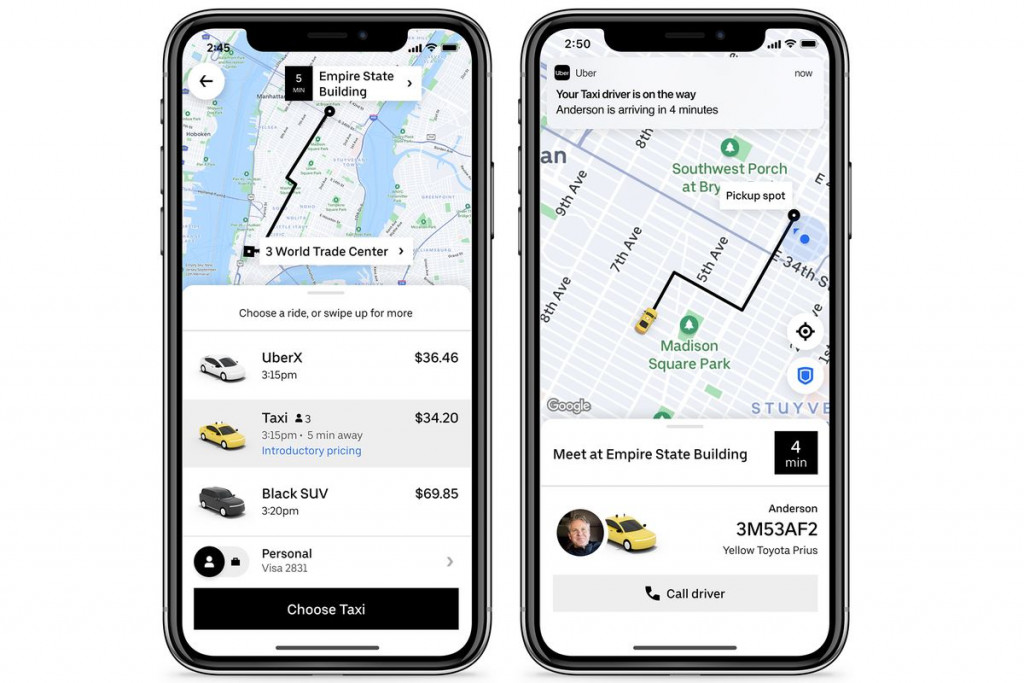
Uber was one of the first large companies to start using Node.js. They used it to create Uber’s massive matching system, which is exactly the feature we love this app for. According to Uber developers, they chose Node.js for three reasons: it allows them to process huge amounts of passengers’ and drivers’ data, implement changes and address errors without the need to restart the app, and constantly improve thanks to the open source community. Overall, Node.js has helped Uber to build a fast, reliable, and scalable technology platform that made the company one of the most successful startups of the last decade.
PayPal

Another famous example of a Node.js application is PayPal, the world’s most-known fintech company. Node.js helped PayPal significantly increase the development speed while decreasing the amount of resources compared to their previous Java application. Now, according to PayPal, all the consumer-facing web applications going forward will be built on Node.js.
Netflix
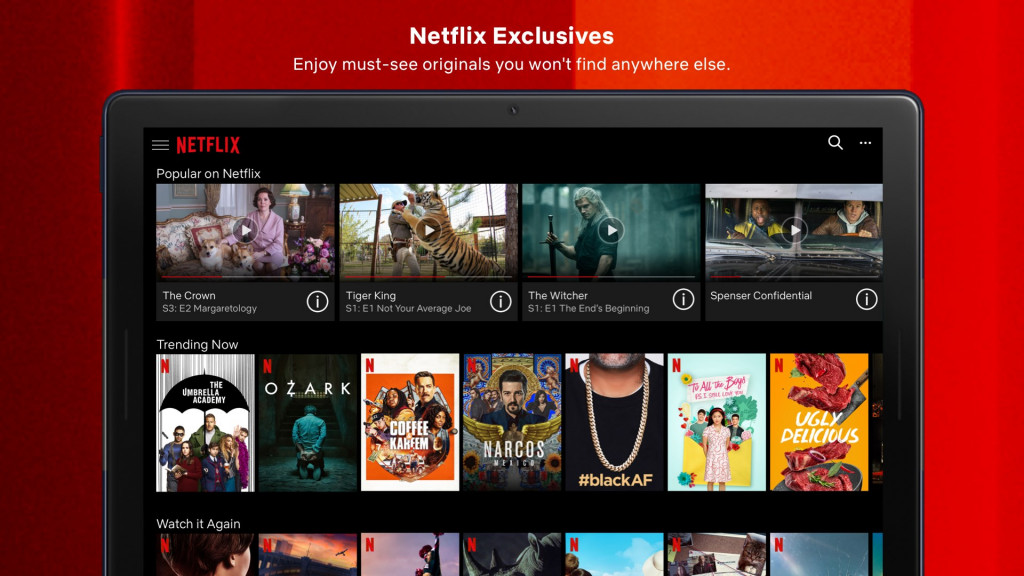
Every time you open Netflix to watch another show, you look at the interface built completely on Node.js. Additionally, Netflix uses Node.js for several other internal tools, such as its content management system, CDN monitoring, and more. Node.js’ ability to handle many concurrent requests and its event-driven architecture make it an excellent fit for Netflix’s high-traffic, real-time streaming platform. It allowed the company to achieve a 70% startup time reduction — an impressive result and a significant change in user experience.

LinkedIn is probably the most famous professional networking platform and a great Node.js application example. The company started its development with Ruby on Rails, but the following switch to Node.js speeded the new mobile app 20 times while cutting the servers from 30 to just 3! Today, Node.js is used throughout LinkedIn, including its learning, web analytics, and content delivery platforms.
Medium

Medium is a popular online platform that allows users to read and write articles. It successfully uses Node.js to handle its high traffic volume and provide a seamless user experience. Additionally, the company uses Node.js to power Medium’s real-time collaboration features, allowing multiple authors to work on the same article simultaneously. And, of course, using Node.js allows Medium to scale seamlessly and handle many users without slowing down or crashing.
eBay

eBay is one of the largest eCommerce platforms offering B2C and C2C sales. According to eBay engineers, several important benefits of Node.js made the company switch to it in many aspects of the development process. They include scalability, speed, performance, simplicity, and transparency. Node.js allows eBay to use JavaScript on both the front-end and back-end of their applications, simplifying the development process and reducing the time it takes to bring new products live.
GoDaddy

GoDaddy is a leading domain registrar and web hosting company with its entire backend built on Node.js infrastructure. According to the company’s Vice President of Engineering, Node.js allowed them to use 10 times fewer servers while reducing the Time To First Byte (TTFB) from 60 ms to ~12 ms. It significantly increased the platform’s performance while cutting the amount of hardware, making the whole development process more effort- and cost-effective.
Mozilla
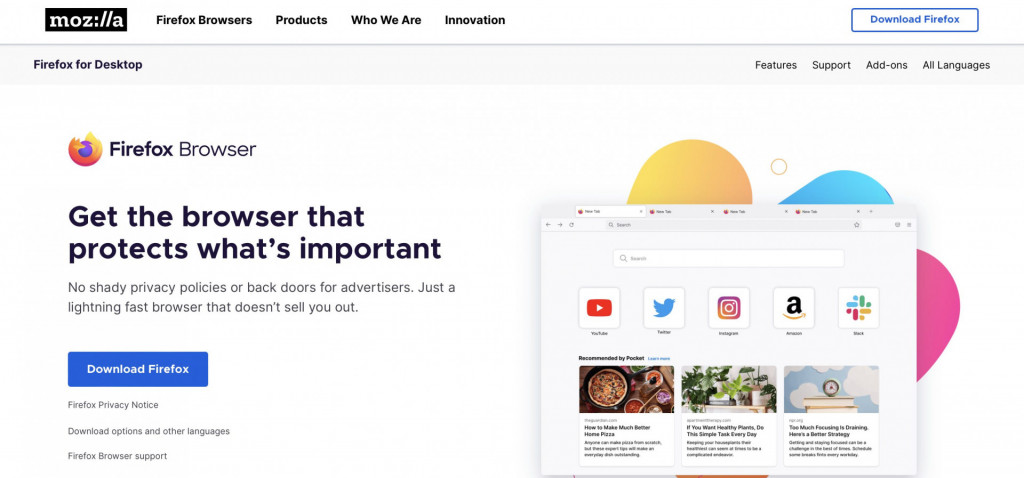
Mozilla, the organization behind the popular web browser Firefox, uses Node.js for various reasons. One reason is to build tools and services that improve the performance and user experience of the Firefox browser. Another reason is to build web-based applications and services that support Mozilla’s mission of open, accessible internet for everyone. According to Mark Mayo, Mozilla’s principal engineer, they decided to switch to Node.js for its “memory footprint” and “cryptography.”
Groupon

Groupon, the e-commerce marketplace, uses Node.js to build and run its high-traffic website. Node.js helps the company handle the large number of requests it receives daily, enabling it to provide fast and reliable services to its users. The switch to Node.js from Ruby on Rails happened back in 2015, resulting in a 50% increase in the web page speed as well as the speed of development and deployment.
Yahoo
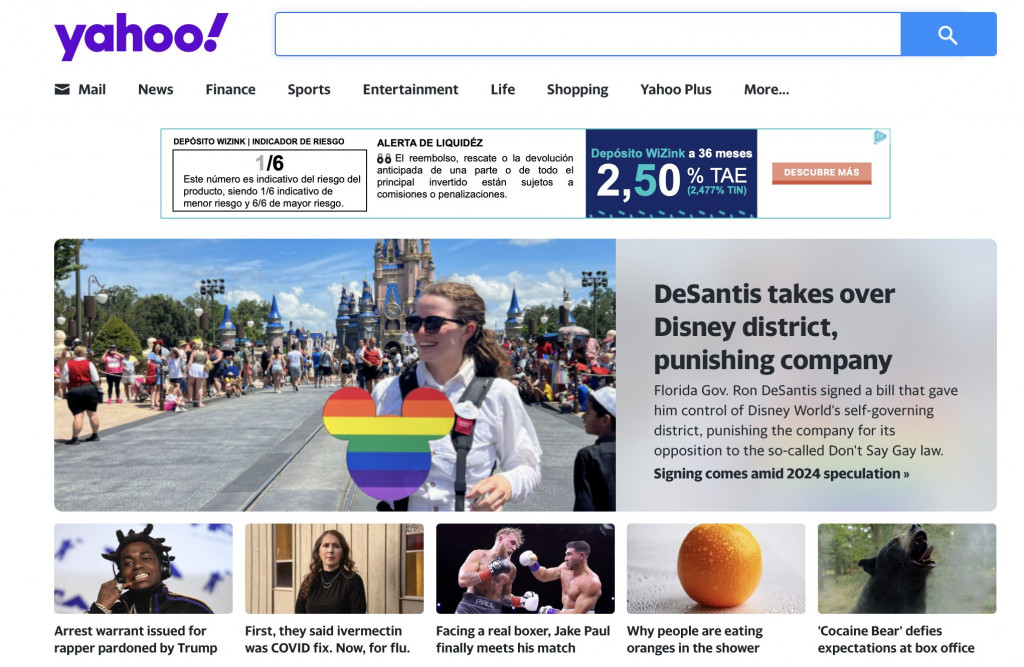
Yahoo, one of Internet pioneers, is mostly known for its web portal and search engine. Just like all the companies we mentioned above, Yahoo engineers chose Node.js for its scalability and high performance. Now it powers almost every part of Yahoo’s frontend, and its use will only rise.
Why Choose Node.js?
As you can see, Node.js is a powerful tool for developers to create high-performance applications. Still not convinced? Here are 5 reasons to choose Node.js for your development projects:
- It’s fast and efficient, thanks to its non-blocking I/O model.
- It’s highly scalable and can handle large amounts of traffic.
- It’s versatile and can be used to build a wide range of applications, including web servers, APIs, real-time chat applications, and more.
- It’s easy to learn and use, thanks to its JavaScript-based syntax and rich ecosystem of libraries and tools.
- It has a big and active community of developers, so you can easily find help and support when needed.
Whether you are building a real-time chat application, a fintech platform, an e-commerce website, or any other web or mobile application, Node.js can offer many benefits and advantages. And if you need someone to build a Node.js app for you or look for Node.js consulting services, the Fireart team of professional developers is always here to help.


